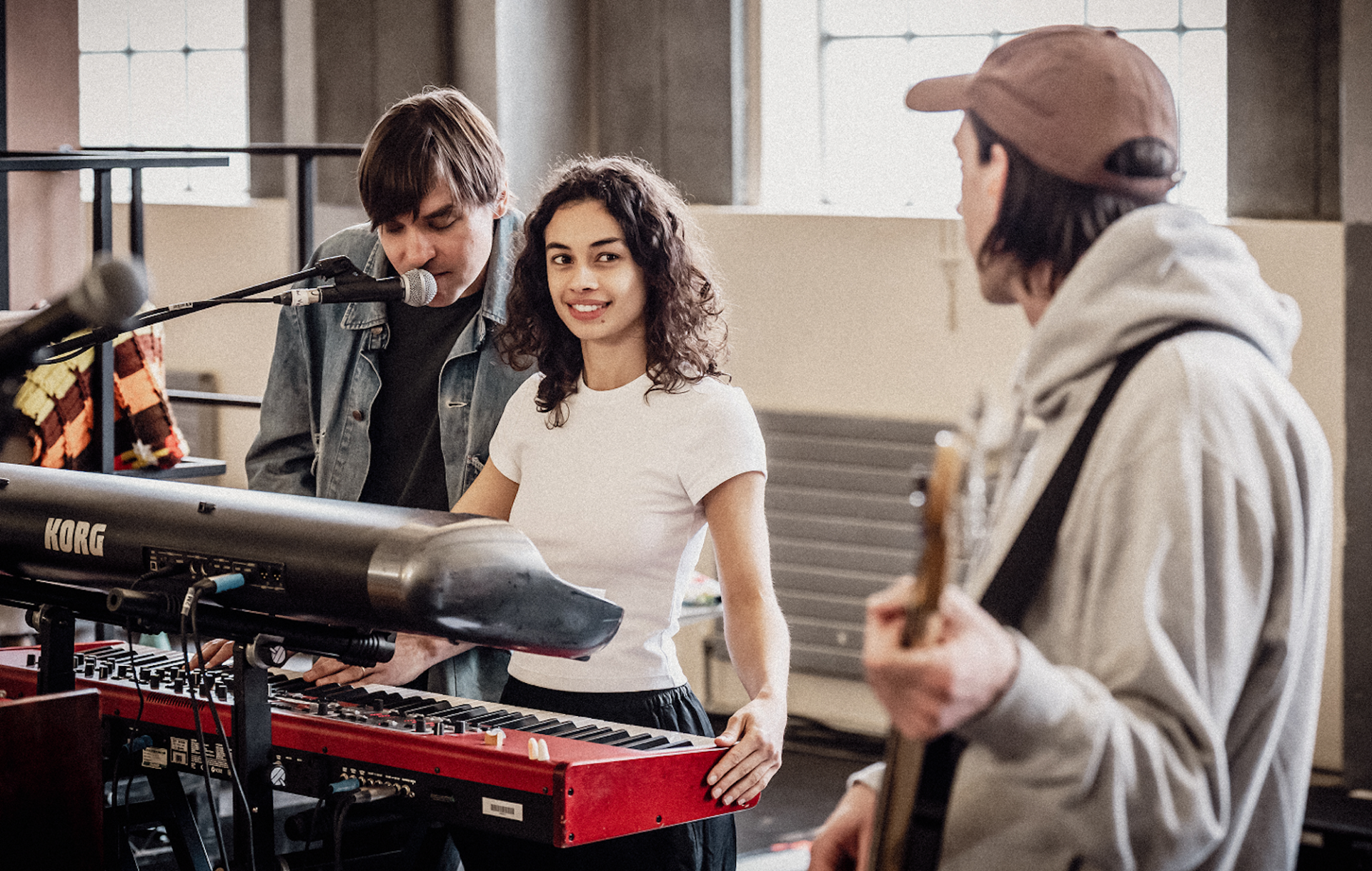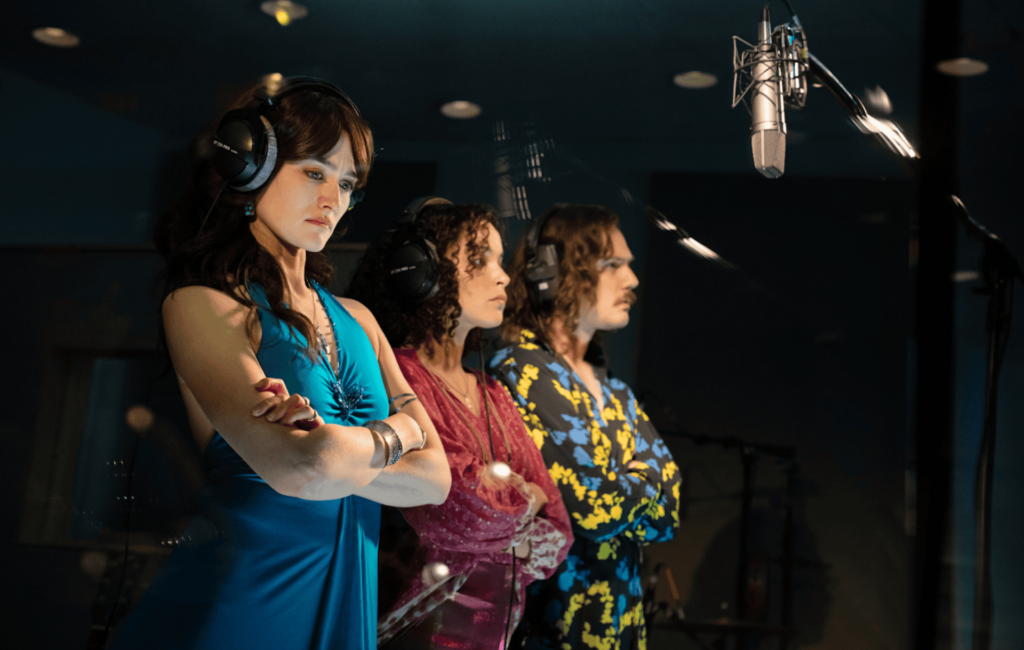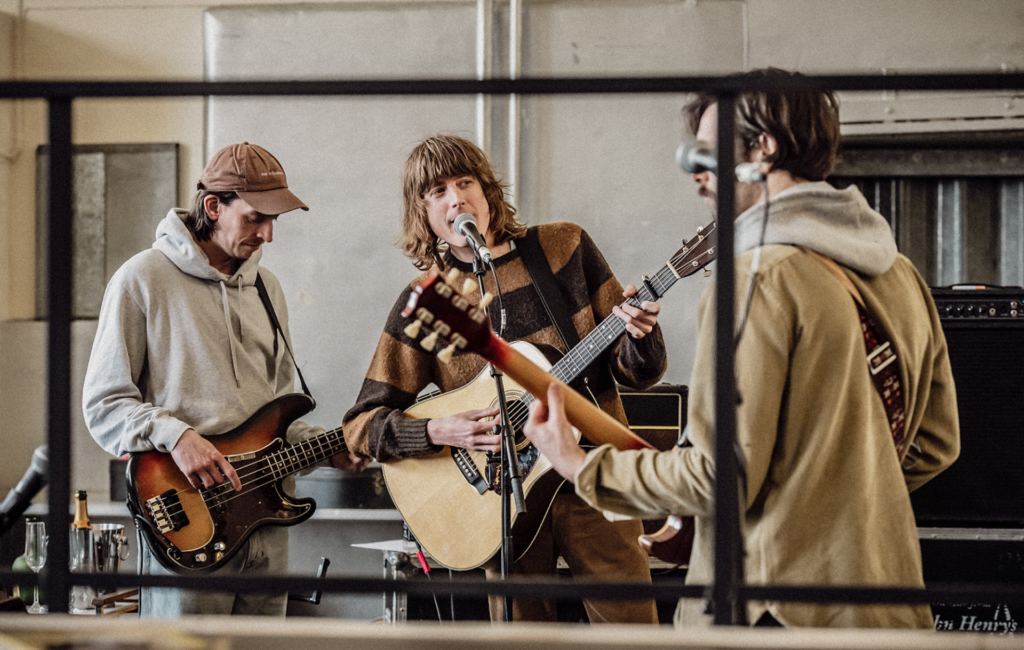Will Butler on bringing ‘Stereophonic’ to the West End: ‘It’s an office drama’
The most Tony Award -nominated play of all time – which follows a brilliant but conflicted band trying to make a masterpiece in 1976 – arrives in London this month

When I enter rehearsals for the upcoming West End run of Stereophonic, Will Butler is in the middle of writing a song for the fictional 1976 band that the hit play is based around.
The play, which launched on Off-Broadway in late 2023 before transferring to Broadway for a record-breaking run, lands in the West End this month. It details the fraught but magical recording of a classic album, and all the inter-band conflict that comes with it.
Butler, formerly of Arcade Fire, worked with creator David Adjmi and director Daniel Aukin since the show’s genesis a decade ago to write the fictional band’s songs, and also led its cast recording of a collection of distinctly 70s rock songs with a Broadway flair.
The song being written right now doesn’t appear in the play itself – it’s purely referenced by the band in dialogue – but Butler wanted his cast for the West End run, made up of original Broadway members and new UK-based actors and musicians, to really live inside the world of the band and their creative journey.
“It’s world building,” musical director Justin Craig smiles at me between run-throughs, with Butler later expanding: “They like playing music, and it’s fun to play new music. Part of it is just that making art is fun, and we’re in a room full of artists. It’s also really trying to serve the play, and by serving the play, it’s trying to nourish the actors. It’s a big job they’re doing.”
It is indeed a big job to follow up the Broadway run of Stereophonic, which became the most Tony-nominated play of all time. Ahead of its UK bow, we spoke to Butler about the musical landscape of 1976 that this fictional album is dropping into, the unique dynamic of bands including siblings and spouses, and why Stereophonic is a play with music, but not a musical.
Read our interview with Butler below. Stereophonic is showing from May 24 at the Duke of York’s Theatre.
What was your initial aim when coming on board to write the music for the play?
I’m new to all this. I’ve been in bands my whole life, but writing music for other people to perform is delightful, but foreign to me. It’s very satisfying. We have a really great music director, Justin [Craig], who’s a rock and roller and has worked on Hedwig and the Angry Inch on Broadway. He’s very musical, and he’s also doing everything in service to the play, and really cares about the music. It’s about trying to draw out what the character of the music is. That’s what a producer does, because an artist goes into the studio, and sometimes the artist knows what’s up, and sometimes the artist is the producer, and sometimes they do a great job, but sometimes you need someone behind the glass being like, ‘Actually, do it this way’. Me and Justin are collectively doing this for the music. Then it’s about working with Daniel [Aukin] the director, thinking about how the music fits within the scenes. How does it fit within the text? What will make this feel the most real? In order for it to feel real, it has to come with from a real place. It’s a different task playing music like this. It’s a different task than either doing a play or doing a musical.
The constant line from the creative team that this isn’t a musical, but a play with music – what does the distinction mean to you, and why is it different?
It means something both very simply and technically. In a musical, you turn to the audience and you sing the songs. You don’t always break the fourth wall, but there’s a crack in the play – there’s a number. This is not structured that way. This is not performed out to the audience at all. It’s in the studio, and it’s in the world of the play, and people are trying to record. They’re not even performing for each other, they’re just trying to make a record. That said, the music does function like a musical in some ways, because that’s how music functions – there’s a crack that lets the light in, and it’s that feeling of living your life, working with these people. This is an office drama. And then there’s a crack, and the light comes in, and you see why they’re in the office. Then it closes again, and they’re like, ‘Why are you playing the drums like an asshole?!’ They get through half a song and it’s like, ‘You’re doing it wrong’. But for half a song, you’re like, ‘Oh, this is why they’re here’. On a very animal level, God willing, your body responds to the music.
It has that Get Back quality of [being] a fly on the wall and that you shouldn’t totally be there. You’re spying on something that’s really delightful, and then the music hits you, and your body knows how to process music. So then you’re like, ‘Oh, I should be here. This is right. Music is right’.

There’s a mix of new and existing cast members for the West End run – how was it working with a new set of people?
The drummer in the band, Chris Stack (Simon), is the only American from the original cast [in the band]. Zach Hart, the bass player, has been in lots of bands, and Jack Riddiford (Peter) has been in lots of bands. Nia [Towle], who plays Holly, is this great musician, but I think she last took a piano lesson when she was 12. Lucy Karczewski (Diana) just sings in the play, and her character is always kind of frustrated that she just sings. She’s like, ‘I wish I had learned how to play an instrument in the play’. But she’s also very musical.
It’s like, ‘Who are these people?’ We met them in a casting room, which is bizarre. Now we’re working together, and it’s like, ‘Who are you guys?’ What is their interior rhythm? I have an interior rhythm that’s informed by the music my parents listened to, and it’s trying to figure out a blend between me and my music, and then the music their parents played for them. It’s 1976 – what were the characters listening to in the 40s and 50s and 60s when they were kids? What is that world?
It’s a unique position to make an album ‘in 1976’ but with 50 years of hindsight – what did that time in music represent to you?
I did want to place things on the continuum. I wanted the end of ‘Masquerade’ to feel like 1977 is coming. I wanted it to exist in history. I wanted it to feel like Simon the drummer listened to girl groups and American R&B. I wanted it to feel like Kate Bush listened to this record when she was a kid, and Kurt Cobain’s parents played this record. It takes place in Sausalito, outside of San Francisco, and just before the play there’s a David Bowie show in 1974 in San Francisco, and Sylvester opens for David Bowie. It’s a world where you’re like, ‘Oh, the people in this band could go to a Sylvester show. They could be going to proto-queer disco parties, and someone’s at a party with Eric Clapton, and he’s being a piece of shit’. You’re hearing all the reggae. In a couple of years, maybe they’re really into Devo, or they’re really into Suicide’.
One big touchstone for me was Bruce Springsteen being really into the band Suicide. When he was making Born to Run, Suicide were in the next studio, and they just became buds. He was super into them and was going to Suicide shows in the Lower East Side. You hear it in Nebraska; ‘State Trooper’ is a Suicide song. Lee Scratch Perry is also a big touchstone, because this play is about the studio as an instrument, and there’s something about cracking the songs open and dubbing things out that you hear in the play, and that was happening in Jamaica, and it was traveling to England and America. The world was connected. People in this band would be listening to Nina Simone and Studio One singles, and their UK band friends, and the weird B-sides of some Chicago blues song. Even if they’re making the plainest vanilla pop, if you’re a real musician, you were always touching everything all the time.

Despite all these touchstones, people are maybe inevitably comparing the band to Fleetwood Mac above all others – has that helped or hampered you?
I think it’s helped it. What I didn’t really process is how many people that like classic 70s rock really like this play. I think there’s something very epic about about the bands of the 70s, about Led Zeppelin and Fleetwood Mac. The Beatles are before then, but they are our Olympian heroes in a lot of ways. Every Greek play is just taking one little detail from the Odyssey and taking those characters and just making up a whole thing from it – let’s just crack open that world. There’s something very epic about having a band that’s mixed from England and from America. That transatlantic thing is mythic. It’s treating history as myth, and then going from there. It’s its own piece of art. I have no qualms that it’s its own piece of art, but it is dealing with myth, and myth does come from the world around us.
The band contains partners and siblings – as someone who was in Arcade Fire with your brother and sister-in-law, and are now in a band with your wife, did that unique insight help when fleshing out these interpersonal relationships in the band?
I never once talked to [Adjmi] about what it’s like being in a band with your brother and with your brother’s wife, but that’s how I spend my whole life. My current band, my wife is in and my wife’s sister is in. The play is very accurate. It’s very real. All my friends in bands who have seen it, who aren’t even in bands with their siblings have said, ‘You asshole! Why’d you make me watch that, that was too true!’ It’s a workplace drama and it’s a family drama. If it was set in a family business, you’d get a lot of that same thing, My dad’s father ran a boat building operation, and they lived next to the boat yard. All their family problems are fundamentally because they had a family business. It’s about how you balance family and professionalism and money and the artisanship of making boats and all these things. They mess you up in specific ways.
It must add a whole extra level of pressure and confusion to the process where, if the band break up, you can’t just leave it at the door and have a totally different life…
There’s a line at the end of the play with Grover the engineer and Diana the singer. He says, ‘Oh, man. That was a nightmare, right?’ She’s like, ‘That was the best thing that’s ever happened to me’. It’s both of those – ‘Wow, that was a nightmare, and that was amazing’. It is what it is.
